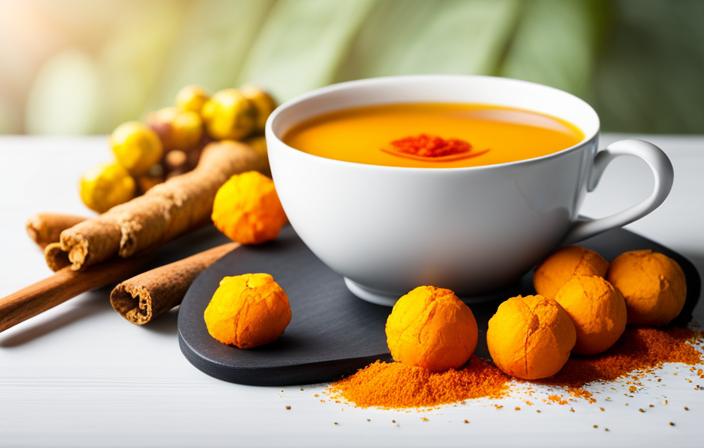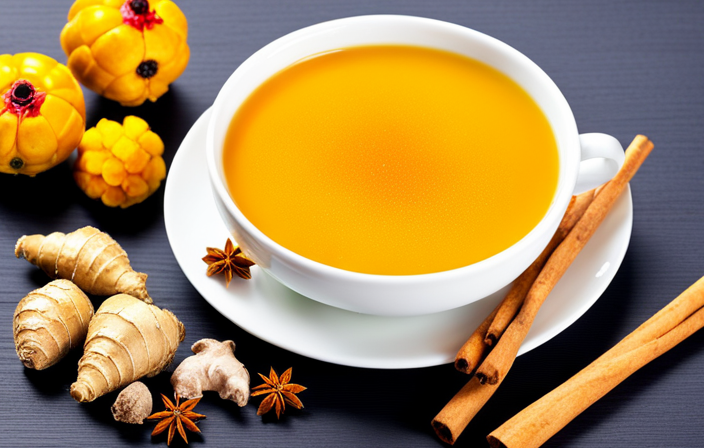I truly enjoy beginning my day by sipping on a hot mug of turmeric tea. Besides its delightful and rich taste, it offers several health advantages, making it an ideal choice for anyone’s morning ritual.
In this article, I’ll be sharing with you my step-by-step process for making ground turmeric tea at home that’s both easy and satisfying.
Before we get started, let me tell you a little bit about why turmeric tea is so beneficial for your health. Turmeric contains an active ingredient called curcumin which has powerful anti-inflammatory properties. This means that drinking turmeric tea regularly can help reduce inflammation in the body and alleviate symptoms of conditions like arthritis, digestive issues, and even depression.
Plus, it’s loaded with antioxidants which protect your cells from damage caused by free radicals.
So without further ado, let’s dive into how to make this superfood tea!
Key Takeaways
- Use high-quality turmeric powder and water to make turmeric tea
- Adding black pepper enhances absorption of curcumin
- Simmering techniques release essential oils for enhanced flavor and aroma
- Strain the tea to remove any remaining particles
Gather Your Ingredients
So, if I want to make ground turmeric tea, the first thing I need is high-quality turmeric powder.
Next up is water – I prefer to use filtered or spring water for a cleaner taste.
Finally, there are optional ingredients like honey or lemon juice that can be added for extra flavor and health benefits.
By having these ingredients on hand, I can easily whip up a delicious cup of turmeric tea anytime I want!
Turmeric
You’ll be amazed at how adding turmeric to your daily routine can improve your health and wellbeing. Not only is it a flavorful spice that adds depth to many dishes, but it also has numerous health benefits.
Here are four reasons why you should incorporate turmeric into your diet:
-
Anti-inflammatory properties: Turmeric contains compounds called curcuminoids, which have powerful anti-inflammatory effects in the body.
-
Antioxidant activity: Curcuminoids also act as antioxidants, helping to protect cells from damage caused by free radicals.
-
Improved brain function: Some studies suggest that curcumin may boost brain function and decrease the risk of age-related cognitive decline.
-
Potential cancer-fighting properties: While more research is needed, some studies have found that curcumin may help prevent or treat certain types of cancer.
Now that you know about the amazing health benefits of turmeric, let’s move on to the next step – water.
Water
Drink plenty of water every day to stay hydrated and improve your overall health – did you know that the human body is made up of about 60% water?
Water is essential for our bodily functions, including digestion, blood circulation, and regulating body temperature. It’s important to use clean, filtered water when making turmeric tea as it enhances the taste and provides numerous health benefits.
When boiling water for turmeric tea, it’s important not to overheat or boil it for too long. Boiling techniques can affect the nutrient content in the water. The ideal temperature for brewing turmeric tea is around 208°F or just below boiling point.
Consuming boiled turmeric tea has been linked to a wide range of health benefits such as reducing inflammation in the body, boosting immunity and improving brain function. Incorporating this warm beverage into your daily routine can contribute positively towards your overall wellbeing.
For an extra flavor boost and added nutrients, you can add optional ingredients like honey, lemon juice or ginger slices to your ground turmeric tea mixture. These additional ingredients will enhance the taste while providing more antioxidant power!
Optional Ingredients
Adding honey, lemon juice, or ginger slices to your turmeric tea mixture can provide a flavorful boost and extra antioxidant power. Honey’s a natural sweetener that also has antibacterial properties. Lemon juice adds a tangy kick of Vitamin C. Ginger not only complements the earthy flavor of turmeric but also has anti-inflammatory effects.
Aside from enhancing the taste of your turmeric tea, these optional ingredients also offer health benefits. Studies suggest that honey can help soothe sore throats and improve gut health. Ginger may reduce muscle pain and lower blood sugar levels. Meanwhile, lemon juice is known for its immune-boosting properties and ability to aid in detoxification.
Experiment with different combinations to find the flavor variations that suit your taste buds best before moving on to prepare your equipment for brewing.
Prepare Your Equipment
Once you’ve gathered all your equipment, it’s time to start preparing your ground turmeric tea. Before anything else, make sure that your equipment is clean and in good condition. Proper equipment maintenance is essential to avoid any unwanted taste or contamination from previous uses. You can wash the teapot, strainer, and cups with soap and water before starting.
Next, choose a brewing technique that works for you. There are different ways to make turmeric tea depending on your preference and available resources. For example, you can use a teapot with an infuser for loose-leaf tea or a single-serve filter if you prefer using tea bags. You may also adjust the amount of ingredients based on how strong you want the flavor to be.
Prepare the boiling water needed for steeping the turmeric tea. Boiling water is necessary to extract all the flavors from the turmeric root powder effectively. To do this step correctly, place a pot of water on high heat until it boils vigorously then turn off the stove once boiling point has been reached. Wait for about 5 minutes before pouring into your teapot or cup with other ingredients already added in it.
Now that we’ve got our equipment ready and our boiling water prepared, let’s move on to actually making our delicious turmeric tea!
Boil the Water
To start the brewing process, you’ll need to bring a pot of water to a rolling boil. Boiling water is the most common method for preparing tea, and it’s important to do so safely. Make sure to use a pot that’s large enough for the amount of water needed, and keep an eye on it while boiling.
The sound of boiling water can be calming and evoke feelings of relaxation. Feeling the steam from the pot can be invigorating and make you feel refreshed. Watching the bubbles form in the water can be mesmerizing and help you focus your thoughts.
Boiling water safety is also crucial when making tea. Always use caution when handling hot liquids and never leave a pot of boiling water unattended. Keep children and pets away from the stove while boiling water, as accidents can happen quickly.
Now that our pot of water has come to a rolling boil, we’re ready to move onto the next step – adding turmeric and any optional ingredients.
Add the Turmeric and Optional Ingredients
Who knew that adding a pinch of turmeric, along with some ginger and honey, could transform your ordinary boiling water into a golden elixir of health and wellness? Turmeric has been used for centuries as a medicinal herb to treat various ailments such as inflammation, digestive disorders, and even depression.
Adding turmeric to your tea not only provides numerous health benefits but also gives it a unique flavor that’s both earthy and spicy. Aside from the traditional recipe, there are many alternative recipes you can try when making ground turmeric tea.
Some people like to add black pepper, which enhances the absorption of curcumin (the active ingredient in turmeric). Others prefer to use coconut milk instead of dairy milk for added creaminess. The possibilities are endless when it comes to customizing your own cup of turmeric tea.
Now that we’ve added the turmeric and optional ingredients to our boiling water, it’s time to let the tea simmer for about 10-15 minutes. This allows all the flavors and nutrients from the ingredients to infuse into the water properly.
So, sit back, relax, and enjoy this warm cup of goodness!
Let the Tea Simmer
As you let the delectable mixture simmer for 10-15 minutes, the flavors will meld together and create a warm, inviting aroma that will tantalize your senses. Simmering techniques are crucial in making ground turmeric tea as it allows the spices to release their essential oils, which enhances their flavor and aroma.
While simmering, make sure to keep the heat low to prevent scorching or boiling over. To add more depth to your turmeric tea, try experimenting with different tea flavorings. You can add cinnamon sticks for a sweet and spicy kick or ginger slices for added warmth and zing.
A splash of honey can also help balance out any bitterness from the turmeric. Adding black pepper is another great idea as it helps increase curcumin absorption in your body. While waiting for your turmeric tea to simmer, take a moment to enjoy the soothing scent that fills your kitchen.
It’s amazing how a simple cup of tea can bring comfort and relaxation after a long day. Once done simmering, strain the tea using a fine-mesh sieve or cheesecloth into your favorite mug and enjoy the comforting warmth that this golden beverage brings.
Strain the Tea
Now it’s time for you to strain that warm, aromatic concoction that you’ve been simmering to perfection, so you can savor every last drop of the golden goodness. Using a tea strainer is the easiest way to remove any remaining particles and ensure a smooth texture. Simply place the tea strainer over your cup and slowly pour the liquid through it.
Herbal infusions like ground turmeric tea tend to have small pieces of herbs or spices that can be left behind in the mix. Straining is important because these bits can sometimes make the drink gritty and unpleasant to consume. By using a tea strainer, you’re able to catch all those little pieces and prevent them from ending up in your final product.
Once your ground turmeric tea has been strained, feel free to add sweetener if desired. This step is optional as some people enjoy their turmeric tea without any added sweetness. However, if you prefer a slightly sweeter taste, try adding honey or maple syrup until it reaches your desired level of sweetness.
With this step complete, we’re now ready for the next section where we’ll explore how sweeteners can enhance the flavor profile of our delicious turmeric drink!
Add Sweetener (Optional)
To enhance the flavor profile of this delicious drink, you can optionally add a sweetener such as honey or maple syrup until it reaches your desired level of sweetness. Adding sweeteners not only enhances the taste but also offers several health benefits.
Here are some sweetener options that complement turmeric tea:
- Honey: This natural sweetener contains antioxidants and has antibacterial properties that may help soothe sore throats and boost immunity.
- Maple Syrup: Rich in minerals like zinc, manganese, and calcium, this natural sweetener may help regulate blood sugar levels and improve digestion.
- Stevia: A zero-calorie alternative to processed sugar, stevia is extracted from the leaves of the Stevia rebaudiana plant. It’s sweeter than table sugar and has no effect on blood glucose levels.
While adding sweeteners to your turmeric tea is optional, it’s worth considering for those who prefer a sweeter taste profile. Remember to use these natural alternatives instead of processed sugars for maximum health benefits.
Now that your turmeric tea is ready with added sweetness (if desired), it’s time to sit back, relax and enjoy its numerous benefits.
Enjoy Your Ground Turmeric Tea
Savor the flavors and health benefits of this deliciously spiced beverage by adding natural sweeteners to your liking. While turmeric tea has a slightly bitter taste, you can make it more palatable by adding honey or maple syrup. Alternatively, you could use coconut sugar or stevia as a healthier option.
You can also experiment with different spice variations to create a unique flavor profile. For example, try adding ginger or cinnamon for an added kick. These spices not only add depth to the taste but also have their own potential health benefits such as reducing inflammation and aiding digestion.
Incorporating ground turmeric tea into your daily routine is an easy way to reap its many health benefits. Turmeric has been found to be effective in promoting overall wellness, from reducing chronic pain to improving brain function. So sit back, relax and enjoy a cup of this golden elixir knowing that you are doing something good for both your taste buds and your body.
In the next section, we’ll wrap up our discussion on ground turmeric tea and its incredible health benefits.
Final Thoughts on Ground Turmeric Tea and Its Health Benefits
In conclusion, incorporating turmeric tea into your daily routine can have numerous health benefits. These include reducing inflammation and improving brain function. Studies show that curcumin, the active ingredient in turmeric, has potent anti-inflammatory effects that may help alleviate symptoms of inflammatory conditions like arthritis and depression. Additionally, research suggests that regular consumption of turmeric tea can enhance brain function by promoting neuroplasticity and reducing cognitive decline.
If you’re looking to reap the benefits of turmeric tea, there are a few simple ways to incorporate it into your diet. You can add a teaspoon of ground turmeric to your morning smoothie or oatmeal for an added boost of flavor and nutrition. Alternatively, try brewing a cup of fresh or dried turmeric root in hot water with a dash of honey or lemon juice for a soothing bedtime drink.
Overall, incorporating turmeric into your diet is an easy way to promote overall health and well-being. Whether you prefer it in supplement form or brewed into tea, this superfood spice offers a host of potential health benefits that are worth exploring further. With all these advantages in mind, let’s move on to our next topic: the benefits of meditation!
Blog Post Title: The Benefits of Meditation
In conclusion to our discussion about the health benefits of ground turmeric tea, I hope you’ll consider incorporating this drink into your daily routine. While it’s not a cure-all, it’s been shown to have positive effects on inflammation, digestion, and overall well-being.
Moving onto our next topic, let’s talk about the benefits of meditation. As someone who’s struggled with anxiety for years, I can attest to just how powerful mindfulness practices can be.
Here are four techniques that have personally helped me:
- Deep breathing exercises
- Body scan meditations
- Loving-kindness meditations
- Mindful walking
By consistently practicing these techniques, I’ve noticed a significant decrease in my anxiety levels and an increase in my ability to focus and stay present.
The benefits of mindfulness extend far beyond just reducing anxiety though – studies have shown that regular meditation practice can also improve sleep quality, lower blood pressure, and even strengthen immune function. If you’re looking for a way to improve your overall health and well-being, incorporating some form of mindfulness practice into your daily routine could be a great place to start.
Now that we’ve discussed the benefits of meditation and mindfulness practices, let’s move onto creating an organized list of tips for incorporating these practices into your daily life without feeling overwhelmed or intimidated by the process.
Create an logically ordered list of 7 items for the Blog Post Title. Do NOT say: Benefits, Meditation, Introduction, Conclusion, FAQ, or FAQs.
First things first, before we dive into the recipe for ground turmeric tea, let’s talk about preparing yourself for a peaceful experience. I highly recommend starting your day with a simple 5-minute breathing exercise to clear your mind and set the tone for a calm day ahead. This will help you to fully enjoy the benefits of this delicious and healthy beverage.
Now that we are in the right mindset, let’s gather our ingredients. For this recipe, you will need ground turmeric, water, honey or another sweetener of your choice, and any additional spices such as ginger or cinnamon. Make sure to use high-quality ingredients for the best results.
Next up is equipment preparation. You will need a small saucepan or pot, a whisk or spoon for stirring, and a strainer if desired. It’s important to choose a pot that is not too large so that the tea can steep properly and retain its flavor.
With these steps completed, we are now ready to dive into making our delicious ground turmeric tea! But before we get started on that ordered list of 7 item(s), let me tell you why this beverage is worth adding to your daily routine…
Ordered List of 7 Item(s):
Now let’s get down to business and whip up this golden elixir that’ll have your taste buds singing with joy. Making ground turmeric tea is a simple process that requires only a few ingredients.
The health benefits of turmeric are numerous, making it an excellent addition to any diet. To make ground turmeric tea, you’ll need one teaspoon of ground turmeric, half a teaspoon of ginger powder, one tablespoon of honey, and two cups of water.
First, bring the water to a boil in a small saucepan. Once boiling, add the turmeric and ginger powder and stir well. Reduce the heat and let simmer for 10 minutes. Afterward, remove from heat and strain into your favorite mug or teacup. Add honey to taste.
There are many different variations of ground turmeric tea that you can try out as well! You could add in some cinnamon or cardamom for extra flavor or steep some black tea leaves alongside your spices for an added caffeine kick.
Experimenting with different combinations is what makes this tea an exciting addition to your routine! With all these variations on offer though, it’s essential always to remember the health benefits that come along with sipping on this delicious drink regularly.
With our piping hot cuppa at hand, we can now move onto something equally soothing: meditation! Meditation is known to help lower stress levels while improving focus and overall mental wellbeing – perfect for helping us navigate through these tumultuous times we face today.
Overview of Meditation
Get ready to relax and improve your mental wellbeing with an overview of meditation – you’ll be amazed at the benefits it can bring to your life! Meditation is a practice that involves training the mind to achieve a state of calmness and relaxation. There are several techniques that you can use to meditate, such as mindfulness, visualization, and guided meditation.
Mindfulness is one of the most popular forms of meditation. It involves paying attention to the present moment without judgment or distraction. The goal is to become more aware of your thoughts, emotions, and physical sensations. By practicing mindfulness regularly, you can reduce stress and anxiety, improve sleep quality, boost immune function, and enhance emotional regulation.
In addition to mindfulness, there are other techniques that you can use to meditate. Visualization involves creating mental images or scenes in your mind’s eye. Guided meditation involves following a script or recording that leads you through a specific meditation practice. Regardless of which technique you choose to use, regular meditation practice has numerous benefits for both physical and mental health. With these tools in hand for achieving inner peace and tranquility through different types of meditative practices in this overview of meditation section, let’s move on towards how reducing stress and anxiety further contributes toward our overall well-being.
Reduces Stress and Anxiety
Reducing stress and anxiety through regular mindfulness practices, such as meditation, can have a significant positive impact on our overall well-being. It’s common knowledge that high levels of stress aren’t healthy for us, both mentally and physically. Mindfulness practices help bring focus to the present moment, allowing us to slow down and take control of our thoughts.
Breathing techniques are an essential component of meditation and can aid in reducing stress and anxiety levels. Deep breathing increases oxygen flow throughout the body, promoting relaxation and reducing tension. Practicing deep breathing daily can help calm the mind and improve mental clarity.
Incorporating meditation into your daily routine doesn’t have to be time-consuming or complicated. Even just a few minutes per day can make a significant difference in reducing stress levels over time. By prioritizing self-care through mindfulness practices like meditation, we can improve our emotional health and overall well-being.
Improving emotional health is crucial for maintaining balance in all aspects of life. Let’s explore how regular mindfulness practice can lead to improved emotional health next.
Improves Emotional Health
Improving your emotional health through regular mindfulness practice can lead to a happier and more fulfilling life. Mindfulness exercises can help you become more aware of your thoughts and feelings, which in turn can help you manage stress and anxiety. By learning how to focus on the present moment, you can reduce negative self-talk and cultivate positive emotions such as gratitude, compassion, and joy.
Stress management techniques are an essential part of improving emotional health. When we experience stress, our bodies release cortisol, a hormone that can have negative effects on our physical and mental well-being. Mindfulness practices such as deep breathing, meditation, or yoga can help lower cortisol levels and improve overall mood. In addition to reducing stress levels, these techniques also promote relaxation and better sleep quality.
Incorporating mindfulness practices into your daily routine may take some effort at first but can result in significant benefits for both emotional and physical health. To emphasize the point further, consider the following table:
| Benefit | Example |
|---|---|
| Improved Mood | Reduced feelings of depression or anxiety |
| Better Focus | Increased productivity at work or school |
| Stronger Relationships | More empathy towards others |
As you start to incorporate these techniques into your daily routine consistently, you will likely notice improvements in many areas of your life. The next section will explore how enhancing physical health is another benefit of regularly practicing mindfulness exercises.
Enhances Physical Health
Enhancing physical health through regular mindfulness practice has been proven to have a multitude of benefits for the body. In particular, incorporating turmeric recipes into your daily routine can have a significant impact on your overall wellbeing.
Turmeric is well-known for its anti-inflammatory properties, which can help reduce inflammation in the body and improve immune function. Studies have also shown that turmeric can aid in reducing joint pain and stiffness, making it an excellent natural alternative to medication for those suffering from arthritis.
Additionally, consuming turmeric regularly has been linked to improved brain function and may even lower the risk of developing Alzheimer’s disease. Overall, adding turmeric to your diet is a simple way to enhance your physical health and improve numerous aspects of your wellbeing.
As we’ll discuss next, these benefits extend beyond just physical health and can even promote better sleep.
Promotes Better Sleep
Getting a good night’s sleep is essential for overall health, and incorporating mindfulness practices like meditation can help promote better rest. However, sometimes we need an extra boost to help us fall asleep faster and stay asleep longer. That’s where ground turmeric tea comes in.
Turmeric contains a compound called curcumin, which has been shown to have anti-inflammatory properties and may also improve brain function. Some studies suggest that consuming turmeric may reduce symptoms of depression and anxiety, both of which can interfere with sleep quality. Additionally, turmeric has been found to increase levels of the hormone melatonin, which helps regulate sleep-wake cycles.
To reap the benefits of turmeric for better sleep, it’s recommended to consume 500-2000 milligrams per day. This can be achieved by drinking one cup of ground turmeric tea before bed or adding turmeric powder to your evening meal. Be sure to start with a small amount and gradually increase as needed.
Incorporating ground turmeric tea into your bedtime routine may be just what you need to improve your sleep quality. In the next section, we’ll explore how this same remedy can also increase focus and concentration during waking hours.
Increases Focus and Concentration
Boosting your focus and concentration can be achieved with the help of incorporating ground turmeric into your diet. Turmeric, a spice commonly used in Indian cuisine, has been shown to have cognitive benefits when consumed regularly. Here are four ways that turmeric can enhance your mental clarity:
-
Reduces inflammation: Chronic inflammation has been linked to cognitive decline and diseases such as Alzheimer’s. The anti-inflammatory properties of curcumin, the active compound in turmeric, may help protect against these negative effects.
-
Boosts neurotransmitters: Curcumin also increases levels of brain-derived neurotrophic factor (BDNF), which promotes the growth of new neurons and enhances communication between them.
-
Helps regulate mood: Studies have shown that curcumin can improve symptoms of depression and anxiety by regulating levels of serotonin and dopamine in the brain.
-
Provides antioxidant protection: Oxidative stress can damage cells and contribute to aging-related cognitive decline. Curcumin acts as an antioxidant, neutralizing free radicals and protecting against this damage.
In addition to incorporating more turmeric into your meals with recipes like golden milk or curry dishes, you could consider taking turmeric supplements for a more concentrated dose. By boosting your focus and concentration with this powerful spice, you’ll be better equipped to tackle tasks at work or home with greater clarity and efficiency.
To transition into our next section about tips for getting started with meditation, it’s important to note that a clear mind is essential for successful meditation practice. Incorporating turmeric into your routine could be one way to enhance mental clarity before beginning a mindfulness session.
Tips for Getting Started with Meditation
Now that we’ve discussed the benefits of turmeric tea for focus and concentration, let’s shift our attention to meditation. Meditation is an ancient practice that has been used for centuries to improve mental clarity, reduce stress and anxiety, and promote overall well-being. However, it can be challenging to get started with this practice if you’re new to it. Here are some tips on how to begin.
Firstly, focus on your breathing technique. It may seem simple, but learning how to breathe correctly during meditation can have a significant impact on its effectiveness. Take deep breaths in through your nose and out through your mouth, focusing on the sensation of the air moving in and out of your body. This will help you stay present and centered during your meditation sessions.
Secondly, finding the right meditation style is crucial. There are many different types of meditation practices available today, including mindfulness meditation, transcendental meditation, loving-kindness meditation, and more. Each style has its unique benefits and focuses on different aspects of mindfulness or relaxation. Experiment with different styles until you find one that resonates with you.
Remember that consistency is key when it comes to building a successful meditation practice. Start small by meditating for just a few minutes each day and gradually increase the time as you become more comfortable with the process. With time and commitment, you’ll reap the numerous physical and mental benefits of this powerful practice!
Frequently Asked Questions
For ‘How to Make Ground Turmeric Tea’:
Turmeric is a spice that has been used for centuries due to its numerous health benefits. It contains a powerful compound called curcumin, which has anti-inflammatory and antioxidant properties. Some studies have shown that turmeric may help reduce the risk of chronic diseases such as heart disease, cancer, and Alzheimer’s.
There are many recipe variations for incorporating turmeric into your diet, but one easy way is to make it into a tea. To make ground turmeric tea, simply add one teaspoon of ground turmeric to boiling water and let it steep for 5-10 minutes. You can also add other ingredients like ginger, honey, or lemon to enhance the flavor and boost the health benefits even more.
How long does ground turmeric tea stay fresh?
How long does ground turmeric tea stay fresh? That’s a great question and the answer depends on how you preserve it.
Ground turmeric tea can last for up to six months if stored in an airtight container in a cool, dry place away from direct sunlight. To extend its shelf life even further, consider storing it in the freezer where it can last for up to two years.
However, keep in mind that the potency and flavor may diminish over time regardless of preservation methods. It’s always best to use fresh ingredients when making your tea for maximum health benefits and flavor.
Can I use fresh turmeric instead of ground turmeric?
Yes, you can definitely use fresh turmeric instead of ground turmeric to make turmeric tea. Fresh turmeric offers a range of benefits that ground turmeric does not, such as higher levels of antioxidants and anti-inflammatory compounds.
Using fresh turmeric also adds a unique flavor profile to your tea that can’t be achieved with ground turmeric alone. To use fresh turmeric in your tea, simply grate or finely chop the root and steep it in hot water for 5-10 minutes before straining.
You can also experiment with different variations of turmeric tea by adding ingredients like ginger, lemon, honey, black pepper, or cinnamon to enhance the flavor and health benefits even further.
How much turmeric should I add to the tea?
When it comes to making turmeric tea, the amount of turmeric you add can vary depending on your taste preference. However, studies have shown that adding at least 1 teaspoon (or up to 1 tablespoon) of ground turmeric to your tea can provide various health benefits.
Turmeric is known for its anti-inflammatory properties and may help with reducing pain and improving digestion. There are also many different recipes available for making turmeric tea, such as adding ginger or honey for added flavor.
So not only does turmeric tea have numerous health benefits, but it can also be a delicious addition to your daily routine.
To answer your question, the amount of turmeric you should add to your tea depends on your personal taste preference, but adding at least 1 teaspoon is recommended for its health benefits.
Can I use a different type of sweetener besides honey?
Yes, you can definitely use alternative sweeteners for your turmeric tea instead of honey. Some great alternatives include maple syrup, stevia, agave nectar, or even just a splash of coconut milk.
These options will still give your tea some sweetness without adding any refined sugars or artificial sweeteners. Plus, turmeric has many health benefits on its own that don’t require any added sweeteners.
Turmeric is known for its anti-inflammatory properties and can help improve digestion and boost the immune system. So even if you choose not to add any sweeteners to your turmeric tea, you’ll still be able to reap the benefits!
Conclusion
In conclusion, making ground turmeric tea can be a simple and effective way to improve your physical health and mental well-being. With just a few ingredients and equipment, you can create a delicious drink that offers numerous benefits.
Drinking turmeric tea regularly has been shown to enhance physical health by reducing inflammation, improving digestion, and boosting the immune system. It also promotes better sleep by calming the mind and relaxing the body. Additionally, turmeric tea increases focus and concentration, making it an excellent choice for anyone looking to improve their cognitive abilities.
Like a warm hug on a cold day, turmeric tea is a comforting beverage that can help you feel relaxed and rejuvenated at the same time. So why not give it a try? Start with this simple recipe and experiment with different variations until you find the perfect blend for your taste buds.
Your body will thank you for it!










